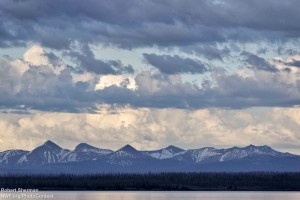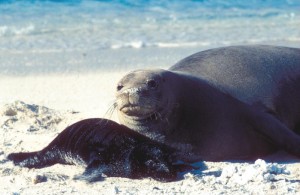We have much more to do and your continued support is needed now more than ever.
Conservation Can’t Wait: What President Obama Can Do Right Now

Limit Industrial Carbon Pollution
Right now, power plants can dump unlimited carbon pollution into our atmosphere absolutely free of charge, with the polluters reaping all the profit and taxpayers bearing the brunt of stronger storms, deeper droughts and intensifying wildfires. The Environmental Protection Agency is developing standards for new power plants and will soon begin work on standards for existing power plants. Last week, the National Wildlife Federation issued a six-month progress report on President Obama’s climate action plan.
It would be inaccurate to call this a do-nothing Congress when it comes to carbon pollution, because today the House Energy & Commerce Committee is set to vote on a plan to block the standards before they can even be finalized. When it comes to industrial carbon pollution, this has been a try-to-make-things-worse Congress.
One last point on the industrial carbon pollution limits. It’s now been seven years since the conservative-leaning Supreme Court validated the Environmental Protection Agency’s Clean Air Act authority to regulate carbon pollution. That was after the Clean Air Act amendments of 1990 were passed on a bipartisan Congressional vote and signed by a Republican president. Since then, Congress hasn’t passed any new carbon regulations while repeatedly voting to uphold the president’s carbon pollution authority. If that’s not exactly what bipartisan lawmaking and checks-and-balance governance looks like, what is?
![]() Speak up for polar bears by telling the Environmental Protection Agency you support strong limits on industrial carbon pollution.
Speak up for polar bears by telling the Environmental Protection Agency you support strong limits on industrial carbon pollution.
Reject the Keystone XL Tar Sands Pipeline
It’s been a rough year for the proposed Keystone XL tar sands pipeline. The State Department’s environmental review has been riddled with embarrassing revelations of conflicts of interest. An Oil Change International report showed that building Keystone XL would be the carbon pollution equivalent of putting more than 37.7 million cars on the road or building 51 new coal-fired power plants. And 2013 was historically disastrous for transporting oil, both via trains and pipelines.
President Obama said last June he wouldn’t approve Keystone XL if it made carbon pollution significantly worse, and with Canada’s emissions now forecast to soar 38 percent by 2030 thanks to tar sands pollution, it’s clear that by President Obama’s own standard, he must say no to Keystone XL.
![]() Speak up for caribou by urging President Obama to reject the Keystone XL tar sands oil pipeline.
Speak up for caribou by urging President Obama to reject the Keystone XL tar sands oil pipeline.
Protect America’s Great Landscapes
President Obama should call on Congress to protect new national parks, wildlife refuges, monuments and wilderness areas, making it clear that he will use his executive authority to do so if Congress fails to act.
Last November, Secretary of the Interior Sally Jewell issued a challenge to Congress when she said, “If Congress doesn’t step up to act to protect some of these important places that have been identified by communities and people throughout the country, then the president will take action.” The last Congress was the first since World War II that did not protect a single new acre of public land, and the current Congress is on pace to become the second, as it did not protect one acre in 2013.
Protecting and growing America’s public lands will also create jobs and boost the economy – for example, recreation on Interior Department-managed lands generated $45 billion in economic benefits and 372,000 jobs in fiscal year 2012.
![]() Tell the Bureau of Land Management to protect the Roan Plateau’s crucial mule deer habitat from drilling.
Tell the Bureau of Land Management to protect the Roan Plateau’s crucial mule deer habitat from drilling.
Restore Full Clean Water Act Protections
Back in 2006, the Supreme Court invited Congress to clarify what waters are covered by the Clean Water Act. In the nearly eight years since, Congress has failed to act and the toxic chemical spill that poisoned the drinking water of 300,000 West Virginians has reminded us how vulnerable our drinking water is to water pollution.
The Obama administration can bolster protection for the nation’s drinking water supplies by issuing its clean water rule to safeguard millions of small streams and wetlands that provide us with clean water. This rule will clarify that these waters are subject to long-standing pollution safeguards under the Clean Water Act, providing greater protection for America’s waters and greater long-term certainty for industry and for landowners.
![]() Tell the Environmental Protection Agency to use the strong science on wetlands and streams to protect river otters from pollution and destruction.
Tell the Environmental Protection Agency to use the strong science on wetlands and streams to protect river otters from pollution and destruction.
Speak Up for Hawaii’s Wildlife & Natural Resources

When the president returns to his boyhood home of Hawaii for a vacation, you often see the first family swimming or going out for an ice cream cone. Why not visit one of Hawaii’s eight National Parks? Visit a rescue center that treats Hawaii’s endangered sea turtles? Speak out for Hawaii’s endangered monk seals?
President Obama would not only be helping wildlife – he’d be giving an assist to his wife’s Let’s Move campaign to help America’s children get active by sending a message that the great outdoors belong to all Americans.
Please donate today to help National Wildlife Federation save endangered monk seals and other wildlife from extinction.






















